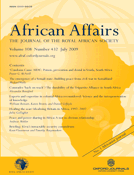-
Views
-
Cite
Cite
Beacon Mbiba, Re-living the Second Chimurenga: Memories from Zimbabwe's liberation struggle, by Fay Chung, African Affairs, Volume 108, Issue 432, July 2009, Pages 503–504, https://doi.org/10.1093/afraf/adp035
Close - Share Icon Share
Extract
History is predominantly the story of the powerful. But in these memoirs, through skilful use of language and respect for the reader's intelligence, Fay Chung has succeeded in keeping her own position of power out of sight. Using a personal narrative, she brings to life familiar ground in Zimbabwe's racial past, the nationalist struggle, and how the ‘revolution lost its way’. Personalities such as Tongogara, Ian Smith and Robert Mugabe are important actors in this account but their agency is subordinated to stronger structural forces. In recent literature on the Zimbabwe crisis this important point is often left out, with Robert Mugabe often portrayed as the sole agent behind the story of Zimbabwe. In this book the struggle for Zimbabwe is presented as a multiplicity of ideological, strategic and practical struggles within the main liberation movements and beyond. Fay Chung makes incisive connections between struggles within ZANU (PF) and between it and ZAPU during the liberation struggle, on the one hand, and the ongoing political instability, especially since 1997, on the other. The liberation movements were not homogeneous and particular emphasis is given to the vashandi and the young intellectuals who lost out to the veteran militarists at decisive stages during the war. Current struggles, she argues, are a series of simultaneous revolutions that are ‘unfinished business’ from the liberation war years.







Comments